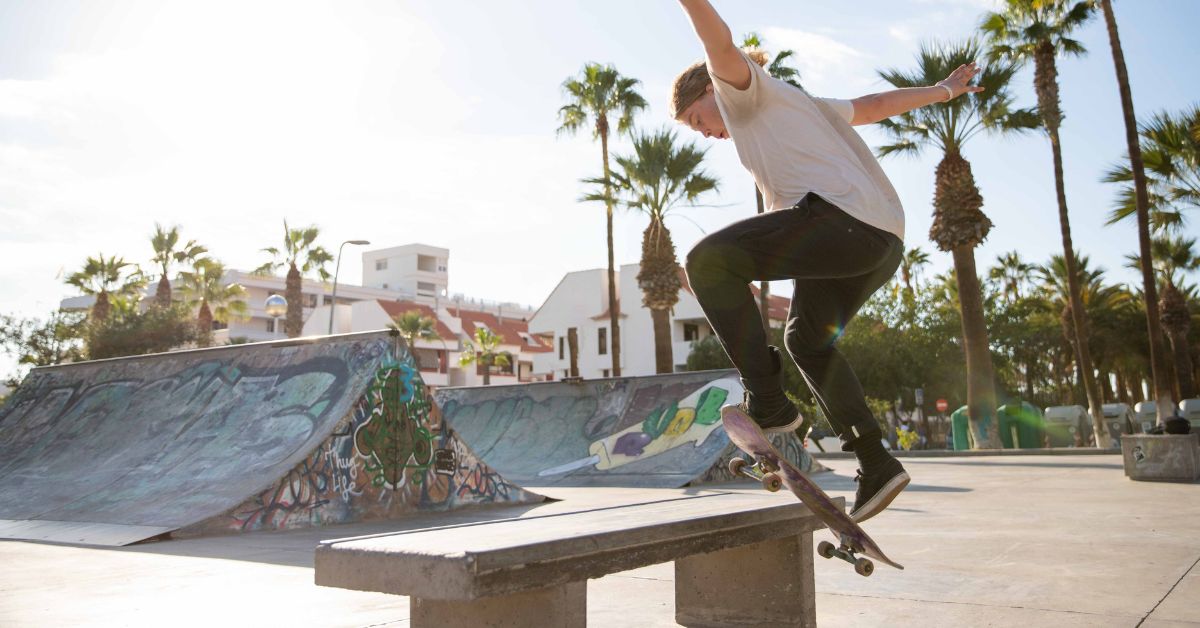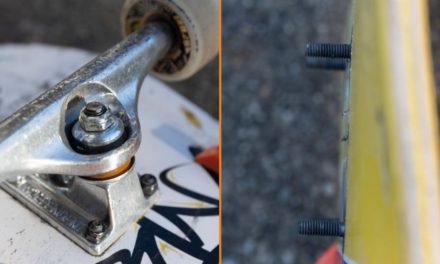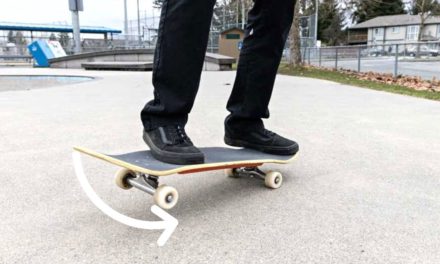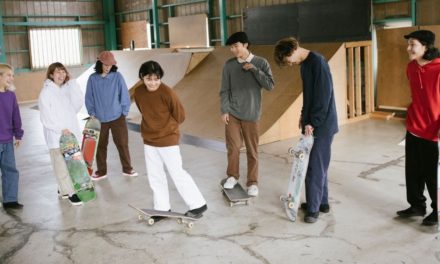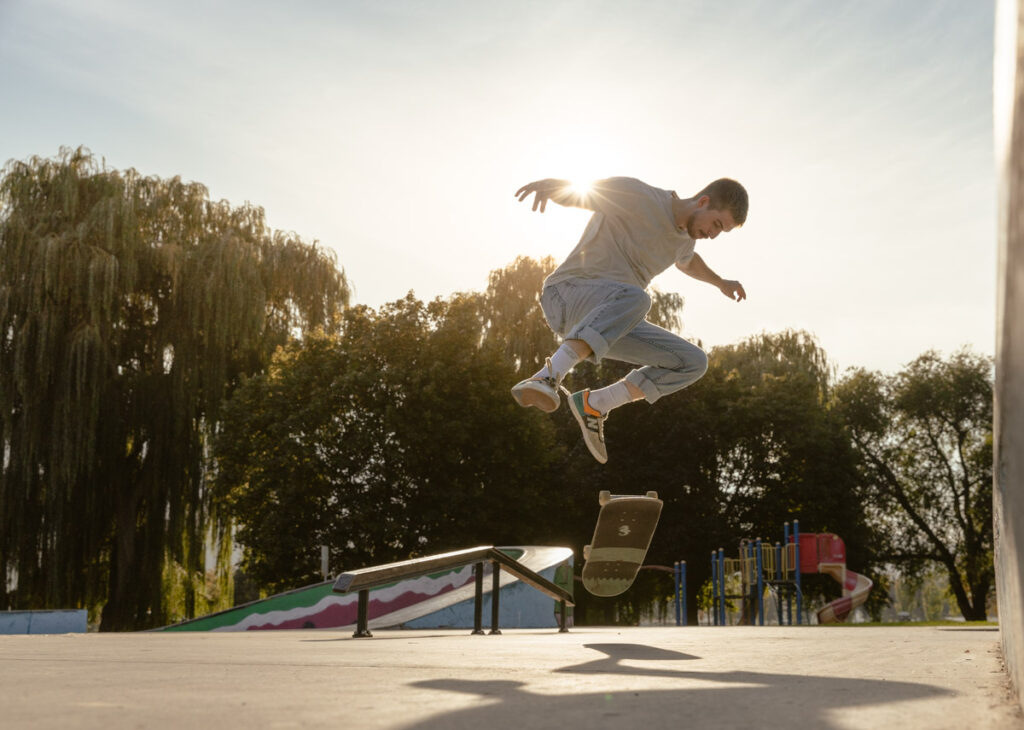Whether you’re just stepping foot on a skateboard or already have a few tricks in the bag, we all want to figure out how to get better at skateboarding as fast as possible. Although there isn’t a magic formula that works for everyone to level up their skills, there are a few things to try that will certainly help.
There is truly no better feeling than learning a new trick and feeling like you’re progressing on your board. With these 20 tips, you’ll be basking in the glory of progression in no time.
How To Get Better At Skateboarding
Depending on your current level of skateboarding, some of these tips will prove more valuable than others. However, these are some tips I found helpful in my progression in skateboarding over the years.
1. Think Of Your Skills Like Climbing A Ladder
The most important thing is to think of all your skills as individual rungs on a ladder. As you learn a new skill, a new rung is added to your “progression ladder” and the further up you get in your progression.
The great thing about skateboarding is that nearly everything can be done in sequential steps to challenge yourself gradually. For example, if you’re just learning to push and balance on your board, then the next step is to try riding down steeper hills and banks at your local park.
If you just learned how to ollie on flat, you can practice doing an ollie over a skateboard or off of a curb.
If you just learned how to 5050 grind on a small ledge, take it to a bigger ledge or try to go for a 5-0.
Every trick in skateboarding can be made more challenging based on a variation of the trick or the feature you do the trick on. So when you land a new trick and begin feeling comfortable with it, start thinking about what the next level would be and start from there.
By continuing to add new skills to your skateboarding to climb the “progression ladder” the faster you’ll see results. This is a much better approach than just trying to learn things way beyond your current abilities.
2. Practice As Often As Possible
Hard work beats talent every day of the week, and the same is true with skateboarding. Sure, some of your friends might land a trick sooner than you, but that doesn’t mean you won’t get there too. By practicing on a regular basis, you begin to feel more comfortable on your board, more familiar with certain tricks, and will notice your skills take off.
Some days might not be as successful as others, but by getting out there a couple of days a week, it’s honestly surprising how quickly your skateboarding improves.
At the very least, 1-2 hours on your skateboard a week will help you see noticeable improvements.
3. Find People Better Than You To Skate With
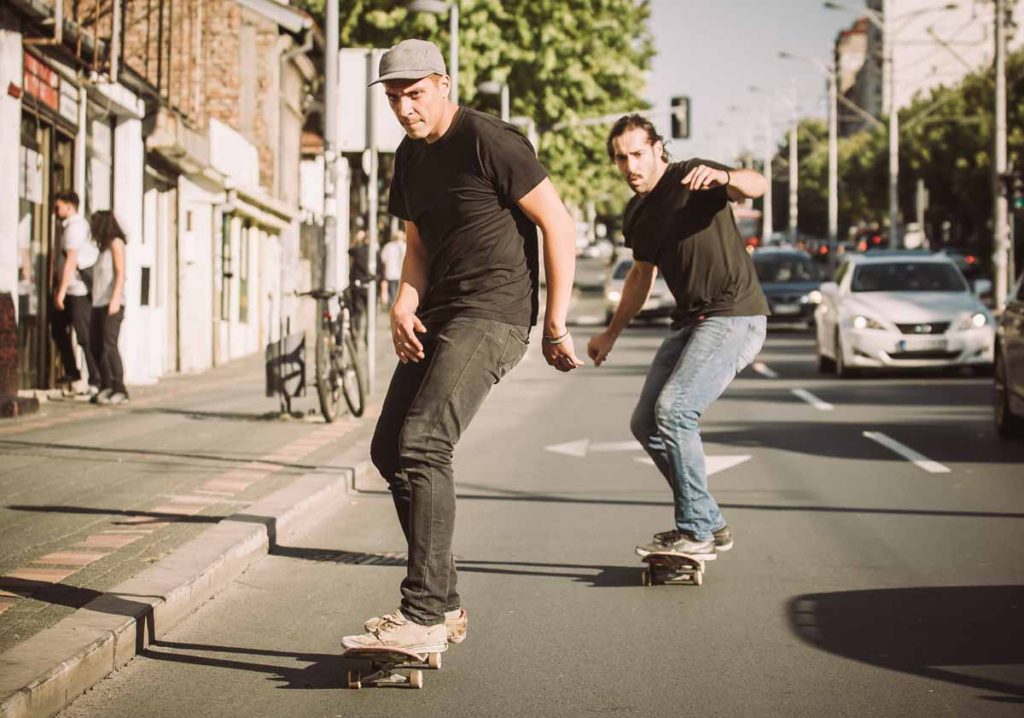
As the saying goes, you are a product of your environment. That’s why skating with people who are better than you helps elevate your skills too. By seeing others trying new things and pushing themselves, you’re more likely to do the same.
Beyond just feeling more motivated, you’ll have more knowledgeable people to give you feedback on tricks based on their personal experience. I’ve had a lot of useful tips given to me by skaters who are way above my skill level. They were just able to notice issues that I didn’t see myself.
Now, this isn’t to say to ditch your friends if they aren’t the best skaters possible. At the end of the day, skateboarding should be all about fun regardless of skill. However, there’s no denying you will pick up some new skills from better skaters.
Luckily even if you don’t know many other skaters, your local skatepark is a great place to meet some shredders.
4. Skateboard Where You Feel Most Comfortable
Especially when you first get started, going to the skatepark or trying to find a street spot can feel intimidating. When you feel uncomfortable and embarrassed where you are skating, it’s pretty hard to get better.
Instead, find a place where you feel comfortable and confident to ride your skateboard and practice. For many people, that comfortable place is the road in front of their house, on a backyard patio, or in an empty parking lot in the evening. Whatever place you feel most comfortable trying new things is a great place to start.
Then as you feel more confident on your board, you can start heading to the skatepark or exploring the streets without feeling like you’ll stick out.
Although you will come to realize that most skaters are very supportive, even if you’re just learning.
5. Don’t Limit Yourself To One Skatepark Or Skate Spot
There is something to be said for getting super comfortable at one skatepark or your favorite street spot. However, this also can be limiting since your skills are only improving on the same predictable features. By going to explore new parks and spots, you’ll find different features that keep you on your toes a bit more.
In many cases, you’ll find things to challenge yourself on that aren’t available at your usual park. So taking your existing tricks and putting them onto new features helps push yourself but also builds your confidence.
I’ve always found that after a skate trip touring a few different places, I come back to my local skatepark with a new sense of confidence and outlook on line options.
6. Consider Cross Training To Improve Endurance
Love it or hate it, training for skateboarding actually makes a difference. Now I’m no personal trainer or gym rat, but I have found that improving cardio, leg strength, and overall fitness is a game changer. For me, it helped me pop higher with less effort, be able to skate for longer, and have a better connection with my board.
There’s an easy bodyweight workout option here to get started with, but at the most basic level, things like lunges, box jumps, planks, and push-ups make a big difference. Adding a few short runs to your week, too, will help you from feeling totally gassed after a few laps around the park.
The great thing about all this is you don’t need to go to the gym and can do these types of exercises at home. Then when it comes time to skate again (and some consistency in your workouts), you can feel the difference.
I’m a strong believer that by improving your general fitness, your abilities in skateboarding will follow suit.
7. Film Yourself When You Get Stuck On A Trick
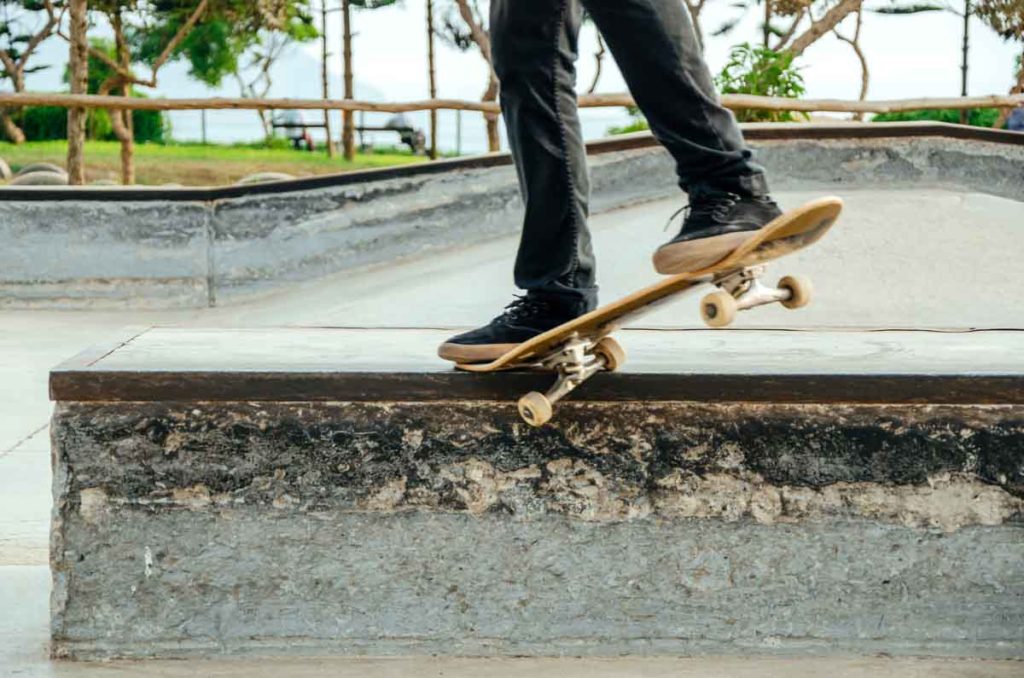
You have probably had a trick that you’ve tried for weeks or even months but still couldn’t figure out how to land it. By taking out your phone and recording yourself trying the trick, it’s amazing how many things you can spot to improve on.
Having that third-person view makes it easier to see how you might not be popping enough, if your hips are rotating weird, or if you’re just not committing. Regularly filming yourself while trying to learn a trick is one of the easiest ways to improve your skateboarding. It’s like having a personal skate coach, except it’s just you judging yourself.
8. Give Yourself Time To Rest & Recover
You’re inevitably going to take a tumble, overwork yourself, and just grind your body down in the pursuit of improvements. When you find your skating seems to be getting worse or plateauing, try taking a break for a few days to recover.
Without realizing it, your body can feel exhausted from endless skate sessions and begin not performing at its best. By allowing your muscles to recover or an injury to heal, you can get back to skateboarding with more endurance and focus than before.
This is one I always struggled with, but some of my biggest steps in improving my skateboarding came after a few days off.
9. Play SKATE With Other Skaters
Playing a game of SKATE with someone of a similar skill level to you is an awesome way to progress because there is something on the line. If you’re a competitive person (like I am), not wanting to lose is enough to make you commit to a trick you wouldn’t usually do on your own.
Even if you don’t have a lot of flat ground tricks in your trick bag, you can play park SKATE with someone instead. That way, you can set any trick on any feature in the park to open up your options beyond flat ground.
10. Ride Your Skateboard To Work Or School
Similar to practicing regularly, riding your skateboard as much as possible is one of the fastest ways to improve. By spending more time just pushing, turning, going over cracks, and dropping off curbs, your baseline abilities on your skateboard will skyrocket.
When the weather’s good, ride your skateboard to work or school if you live nearby. If it’s a longer commute, throw your board in your car or backpack and take it out for a lunchtime cruise. Heck, you could even stop by the skatepark on your way home too.
If you plan on commuting around town, I’d highly suggest getting some cruiser wheels to make the ride more enjoyable. If you have the extra cash, a full cruiser board can be an awesome option too.
11. Attend Or Enter Local Skate Contests

Most skateparks and cities have skate contests in the late spring and summer. Try to keep an eye on when they are happening, and try to go and watch or even compete if you feel ready.
Watching skate contests at your local park is often eye-opening for different line choices you may have never considered. Then when it comes time to skate yourself when the contest is over, your head is filled with ideas on new tricks and sequences to try.
On the other hand, if you compete, it forces you to try something new and skate at your best. It’s like playing a game of SKATE, but with higher stakes since you probably want to win a prize. Most contests have heats based on skill levels, so even if you’re not the best skater in the contest, there is room for you to have a fighting chance.
Regardless of whether you go to watch or actually try skating in it yourself, contests are another great way to get better at skateboarding.
12. Stay Motivated By Watching The Pros
Watching video parts, skateboard movies, or pro competitions like Dew Tour or X-games is guaranteed to fire you up for another skate session. That way, you have a fire lit in your belly next time you’re trying a new trick.
Even if the skating you’re watching is way above your pay grade, it’s motivating to see what’s possible and have something to strive towards. Street spots in a video part might give you ideas for a spot you saw in your town, or a pro skate competition might show you some new tricks to think about.
But probably on a smaller scale, of course.
Although Youtube has tons of great skating content out there, Red Bull TV is another great (and free) place to get pumped up about skateboarding.
13. Try Different Styles Of Skateboarding
When most people learn how to skateboard, they focus on one “style” or discipline of the sport. For example, you might only skate street, only skate transition or only practice flat ground.
To speed up how quickly your skateboarding improves, practicing all of these disciplines will work wonders. There are skills that each style of skating offers, and they can work together to make you a more well-grounded skateboarder.
Even if you’re a complete beginner, learning how to ollie on flat ground, ollie out of a bank at the skatepark, and air out of a quarter pipe are all similar skills between different features. This takes one skill and spreads it across all types of features that inevitably boost your confidence on your board.
14. Practice Fakie And Nollie Trick Variations
A quick win for just about any new trick you learn is to try it fakie or nollie too. Admittedly, fakie tends to be much easier to land quickly than nollie tricks, but the rule still applies.
For example, if you can do a kickflip, go for a fakie flip, and you’ve almost instantly added to your bag of tricks.
If you learned to pop shuvit, try it fakie and nollie too, and you suddenly tripled your trick selection.
Essentially, fakie and nollie variations help with your progression by adding a bit of challenge to the tricks you already feel the most confident with.
15. Try New Tricks On Grass To Boost Your Confidence
For some flat ground tricks that you are too scared to commit to, take your skateboard to a flat patch of grass and try the trick there instead. Having a softer landing pad where your board can’t slip out does wonders for your commitment and head game.
After landing the trick a few times confidently on the grass, you’ll be far more confident to stomp the trick on the cement. This is a little “hack” I’ve used a lot when learning flip tricks, and it’s worked well for my skateboarding.
Even if it might look a bit goofy, it works!
16. Make Sure You Have A Proper Skateboard Setup
For some of you, this probably goes without saying, but having a real skateboard setup makes a huge difference. I’m talking something from an actual skate shop and not one of your first picks from Amazon or Walmart.
A lot of kids’ or “beginner” skateboards you find online are made of low-quality materials, have bad grip tape, lack concave, and have plastic parts where they should be metal. To improve your skateboarding and not limit yourself, you need to make sure you have a decent skateboard.
Depending on whether you buy a complete or a custom skateboard, the price can range from $110 to $200+ based on the brand and components you buy. For anyone just starting, a high-quality complete is a great starting point.
You can find a list of the best skateboard deck brands to look for here.
17. Repeat Every Trick You Know When You Skate
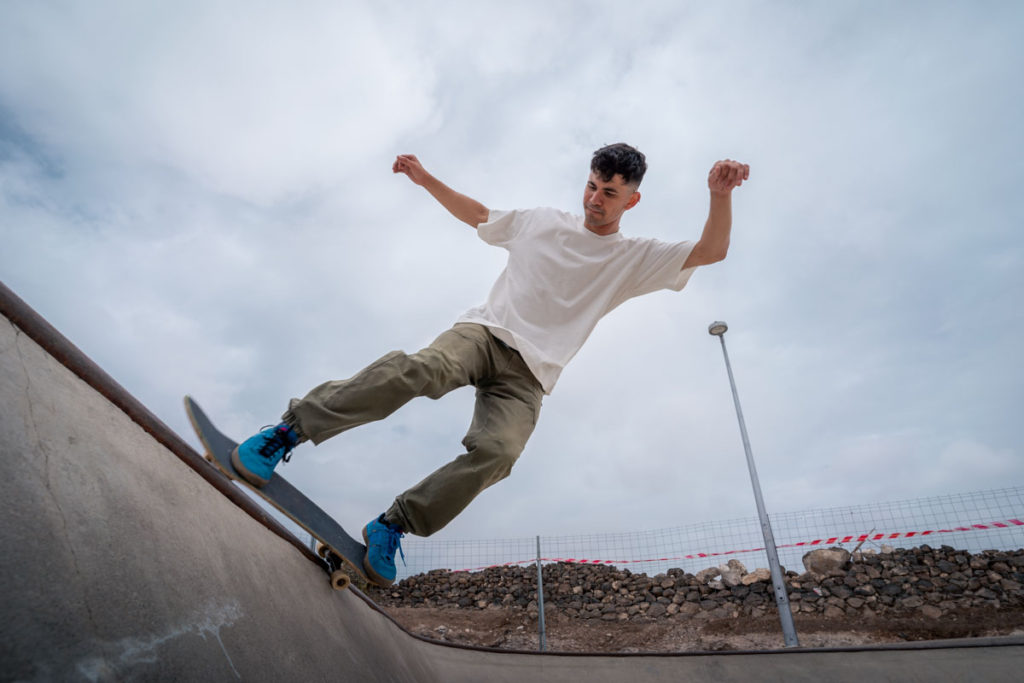
When I was younger, I would try new tricks every time I went skateboarding. By the time I came back to a trick I last landed months ago, it felt awkward and unnatural. It wasn’t until I started regularly repeating every trick I could do that I found my consistency and overall ability levels improved.
Repetition is the key in skateboarding, and the more you do a trick, the easier it becomes. Once a trick feels effortless on flat, it doesn’t feel that scary to try it down a drop or small set of stairs. That’s because you’ve done it so many times that the trick doesn’t even phase you anymore.
So that’s why I’m convinced that repeating all the tricks you know regularly is one of the golden tickets to getting better at skateboarding.
18. Make Sure You’re Actually Having Fun
It’s one thing to grind away at learning something in the name of passion, but it’s another thing to grind away because you feel like you have to. Skateboarding should feel fun, and the tricks you are learning should feel exciting. If you’re putting too much pressure on yourself, the odds are that you won’t improve as quickly.
Instead, put enjoying yourself at the top of your to-do list, and the rest will follow. Even if you aren’t doing the biggest and baddest tricks, if you’re having fun on your board, you are guaranteed to get better.
19. Don’t Be Afraid To Ask Questions
Once you start to get to know other skaters at your local park, don’t be afraid to ask questions or look for feedback on your skating. Sometimes having an outsider’s opinion of how to approach a feature or to see why you aren’t landing a trick can help a lot.
Most people are happy to help and are excited to be a part of you getting better at something. Even if just a simple question on how to do a trick, you’ll often get a real-life trick tip explanation that’s incredibly useful.
I’ve had my fair share of those over the years, that’s for sure.
20. Stay Dedicated To Skateboarding
Last but certainly not least, staying consistent with your skating and not giving up is the most crucial step in getting better. The more hours you put in, the better you will naturally become. Although your progression may have its peaks and valleys, the overall skills will drastically improve over time.
Even if you can only get out once a week after work, it’s better than nothing!
And as life get’s busy, don’t beat yourself up because you haven’t been out in a while. After all, you have a lifetime to skateboard, and you’ll always find ways to have fun regardless of how good you are.
Happy Shredding!
Brendan 🙂

